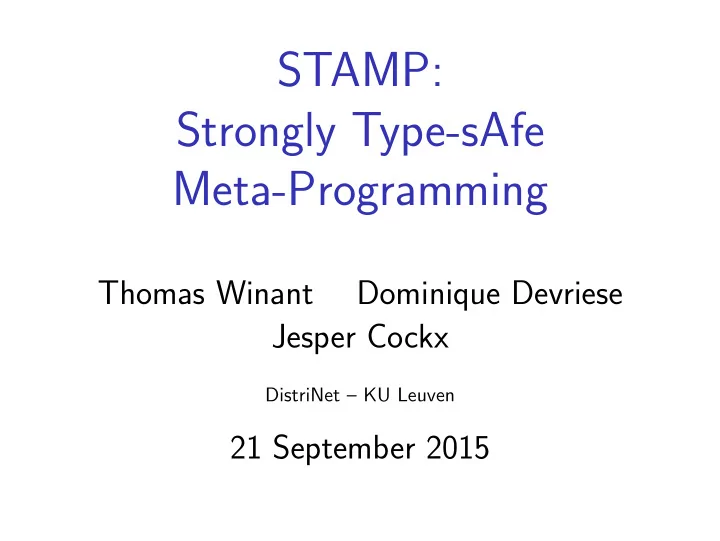

STAMP: Strongly Type-sAfe Meta-Programming Thomas Winant Dominique Devriese Jesper Cockx DistriNet – KU Leuven 21 September 2015
Type-safe metaprogramming: Overview Most metaprogramming is weakly type-safe (e.g. Template Haskell) generated programs may contain type errors type checker checks generated code With Agda as metalanguage, we can do better: embed Haskell type system in Agda generated code type correct by construction 1 / 10
STAMP: Strongly Type-sAfe Meta-Programming 1 Why STAMP? 2 Examples 3 The STAMP architecture 4 The Agda encoding
STAMP: Strongly Type-sAfe Meta-Programming 1 Why STAMP? 2 Examples 3 The STAMP architecture 4 The Agda encoding
Why strongly type-safe metaprogramming? we cannot test all possible pieces of code generated by a metaprogram type errors in generated code are impossible to debug by the user types document what can be expected of the metaprogram 2 / 10
Why use Agda instead of a special-purpose metalanguage? We can generate both the type and the typing context of the metaprogram together with the program itself 3 / 10
STAMP: Strongly Type-sAfe Meta-Programming 1 Why STAMP? 2 Examples 3 The STAMP architecture 4 The Agda encoding
Pick k’th from n function arguments Given k and n, generate the following definition pick :: a1 -> ... -> an -> ak pick x1 ... xn = xk 4 / 10
Automatic deriving Derive Eq Derive lenses 5 / 10
STAMP: Strongly Type-sAfe Meta-Programming 1 Why STAMP? 2 Examples 3 The STAMP architecture 4 The Agda encoding
The STAMP architecture Added syntax to Haskell to make a STAMP call STAMP works as a Core2Core plugin call corresponding Agda metaprogram translate Agda representation to Haskell Core splice generated code into the right position 6 / 10
Current shortcoming calls to Haskell functions in generated code are not checked type error only after translation to core solution: need to generate Agda interface based on Haskell code 7 / 10
STAMP: Strongly Type-sAfe Meta-Programming 1 Why STAMP? 2 Examples 3 The STAMP architecture 4 The Agda encoding
The Agda encoding Fairly standard encoding of System F C Kinds Types depend on kinds Terms depend on types 8 / 10
Weakening and substitution definition of Term datatype requires weakening and substitution of types we take TySubst Σ 1 Σ 2 = All ( Type Σ 2 ) Σ 1 9 / 10
Design based on Haskell documentation good to verify correctness w.r.t. Haskell specification not very convenient for writing metaprograms (substitution hell) based on our experiences now, we hope to add a convenience layer later 10 / 10
Recommend
More recommend